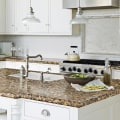Yes, you absolutely can just replace kitchen countertops without committing to a full kitchen remodel—and for many homeowners, it’s one of the most effective ways to refresh the space while staying within budget. Countertops take center stage in both function and style, and updating them can dramatically transform your kitchen's look and feel. If your cabinets are still structurally sound and your layout is working for you, there’s no reason to rip everything out. Swapping out old countertops for newer, more modern surfaces like quartz, granite, or butcher block is a practical, high-impact upgrade that doesn’t necessarily require changes to plumbing, cabinetry, or appliances. Much like hiring roofing contractors to replace only your shingles rather than rebuilding the entire roof structure, countertop replacement is a focused renovation that delivers big returns without the chaos of a full tear-out.
Assessing Cabinet Compatibility
Before diving into countertop replacement, one of the first steps is evaluating the condition of your existing cabinets. Are they level? Are they sturdy enough to support the weight of a new countertop, especially if you’re switching to heavier materials like granite or concrete? If the answer is yes, you’re in great shape. Most countertop installers will inspect your cabinets during the initial consultation to ensure they can safely accommodate the upgrade. Minor modifications—like reinforcing cabinet framing or correcting small alignment issues—can be done quickly and affordably, allowing the installation to proceed without a full cabinetry overhaul.
Considerations for Sink and Backsplash Integration
Another important consideration is how the new countertop will interact with your sink, faucet, and backsplash. If you’re planning to keep your existing sink and fixtures, measurements must be precise to ensure everything fits properly. Undermount sinks, in particular, require careful planning, as they’re typically glued beneath stone or solid-surface countertops and may not be compatible with all new materials. Similarly, your existing backsplash may need to be removed or modified depending on the thickness and height of the new countertop. Fortunately, many countertop projects include options for installing a matching backsplash strip, creating a seamless transition that enhances the overall aesthetic and function.
Material Choices and Installation Time
One of the most exciting parts of replacing your countertops is selecting the material that matches your vision and lifestyle. Laminate is a cost-effective option with a wide range of colors and patterns. Quartz and granite offer durability and a high-end appearance, while butcher block adds warmth and rustic charm. Each material has its own pros and cons in terms of maintenance, stain resistance, and heat tolerance, so it’s worth consulting with your installer to find the best fit. Once materials are chosen and measurements are finalized, fabrication usually takes a week or two, with installation often completed in a single day. This rapid turnaround is part of what makes countertop replacement so appealing—it delivers major visual impact with minimal disruption to your daily life.
Budgeting and Return on Investment
Replacing kitchen countertops is one of the most cost-effective renovations you can undertake in terms of return on investment. According to real estate professionals, updated countertops consistently rank among the top features that buyers look for in a kitchen. The cost varies widely depending on material choice, project complexity, and geographic location, but the average homeowner can expect to spend anywhere from $1,500 to $4,500. If paired with a fresh coat of paint on cabinets or new hardware, the results can rival a full renovation at a fraction of the price. Just be sure to get multiple quotes and work with experienced contractors who specialize in countertop installation to ensure quality results.
Other Benefits of a Standalone Countertop Replacement
Beyond aesthetics, replacing your kitchen countertops can solve practical issues like damage, burns, chips, or unsightly seams. It also allows for customization—you can add features like an overhang for bar seating, install a more functional edge profile, or even integrate charging stations and cutting board insets. This type of update enhances the overall usability of the space without requiring plumbing reroutes or major construction. Plus, if your current counters have seen years of wear and tear, a replacement brings peace of mind with improved hygiene, easier cleaning, and a surface that’s ready for the next decade of use.
Conclusion: A Smart, Streamlined Upgrade
In summary, replacing kitchen countertops as a standalone project is not only possible—it’s often the smartest and most efficient path to a refreshed kitchen. By keeping your layout and cabinets intact, you save time, money, and hassle while enjoying a dramatic style upgrade. With thoughtful planning, quality materials, and skilled installation, new countertops can redefine the look and function of your kitchen in just a matter of days. Whether you’re preparing to sell your home or simply want to enjoy your space more, countertop replacement offers high impact with minimal commitment—just like working with professional roofing contractors for a targeted, results-driven improvement to your home.






